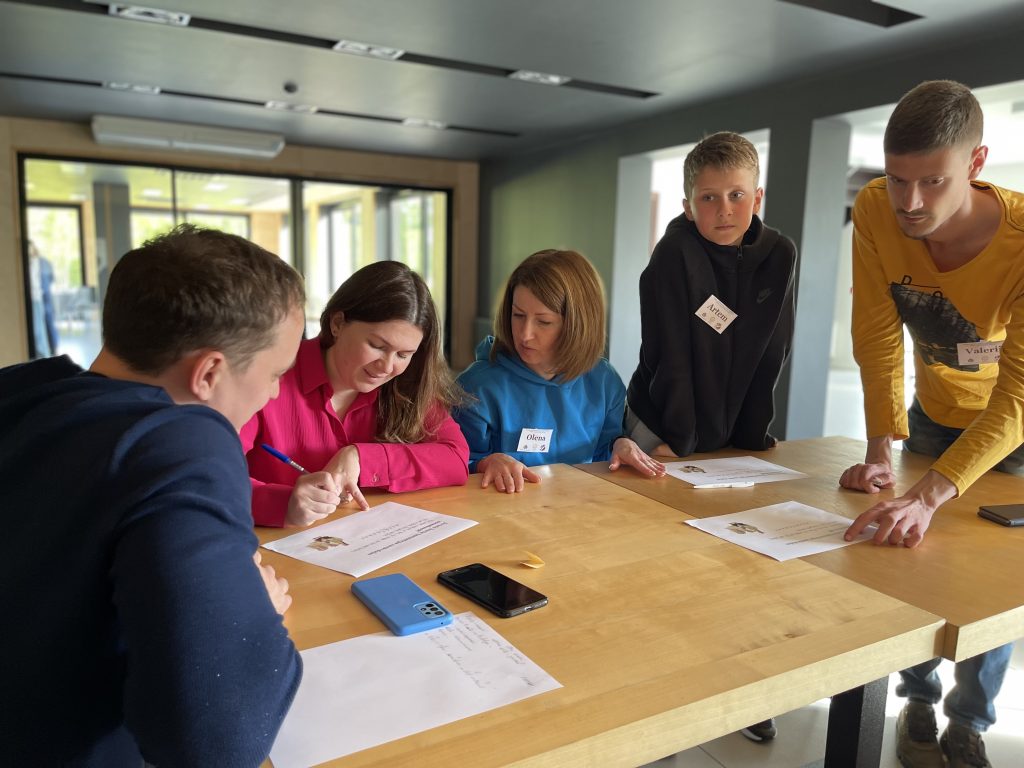
The cohesion event for the project “STIPRI KOPĀ-3. СИЛЬНІ РАЗОМ-3” (STRONG TOGETHER-3), held on May 11-12, 2024, marked a significant milestone in the integration efforts of Ukrainian civilians into Latvian society. Organized by Daugavpils University’s “Intellect Park” and funded by Latvia’s state budget through the Society Integration Foundation, this event aimed to foster cultural orientation and inclusion activities for Ukrainian civilians learning Latvian.
The two-day event provided a platform for 40 Ukrainian civilians and representatives of the host community to engage deeply with Latvian culture, history, and language. It was strategically designed to enhance their knowledge of Latvia’s societal structure, communication patterns, and cultural heritage while promoting cross-cultural understanding and cooperation.
The event kicked off at the “Lejasmalas” leisure complex in Auleja parish, Krāslava municipality, where Maija Burima, chairperson of “Intellect Park”, and project manager, started off the event. She outlined the goals, activities, and expected outcomes, emphasizing the importance of cultural immersion and community collaboration. Participants were introduced to the language club “Latvijas kultūrt-Elpa”, where they participated in activities aimed at improving Latvian language skills and communicative competence.
Activities such as the team game “Latvia” and the “Recipe Restoration” session deepened participants’ understanding of Latvian nature, culture, and culinary traditions. In the game “Latvian Traditions”, they explored seasonal festivals and customs, integrating cultural knowledge through interactive learning experiences. The drama performance “In Latvia, I like the most…” showcased their creativity and cultural insights, reinforcing traditional values and historical perspectives.
Beyond cultural activities, therapeutic workshops played a crucial role in enhancing emotional well-being and empathy among participants. The “Dance and Movement Therapy” masterclass introduced Ukrainian civilians to Latvian dance forms and exercises, promoting emotional resilience and positive feelings. Similarly, the “Art Therapy” session allowed them to express emotions through mandala drawing and neurographics, fostering mutual support and healing.
One highlight was the story therapy workshops at “Stāstnīca”, where participants collaboratively created stories reflecting personal experiences and cultural encounters. Led by trained facilitators, these sessions integrated language learning with emotional expression, enhancing overall participant engagement and well-being.
Excursions to local businesses like the “Kurmīši” farm in Ūdrīši parish, known for its herbal teas and sustainable agricultural practices, provided practical insights into successful entrepreneurship and cultural preservation. Participants learned about medicinal plants native to Latvia and tasted traditional Latgalian cuisine, linking cultural immersion with economic sustainability.
At the biological farm “Klajumi” in Kaplava parish, participants explored Latvian horse breeding and organic farming practices. This visit highlighted the farm’s role in preserving Latgalian culinary traditions alongside its agricultural pursuits. Participants engaged with farm owners, discussing business development in rural Latvia and appreciating the farm’s multi-faceted contributions to local culture and economy.
The excursion around Krāslava showcased historical landmarks such as the Plāteru Castle complex, enriching participants’ understanding of Krāslava’s rich heritage and economic opportunities. Discussions during these visits underscored the importance of cultural heritage preservation and community-driven initiatives in promoting regional development and integration.
Ukrainian civilians acknowledged that participating in cohesion events was a great opportunity to promote the integration of Ukrainian civilians into Latvian society, to learn about Latvian cultural and historical traditions and values, and to gain valuable experience in small business initiatives, assessing their potential for involvement.
The project is financially supported by the Society Integration Foundation from the allocated funds of the Latvian state budget.
The content and activities of the project are overseen by the Daugavpils University Association for Lifelong Learning, Cultural and Science Communication “Intellect Park”.
